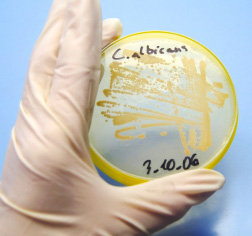Thrush

What is thrush?
Thrush occurs when the fungus Candida albicans grows rapidly on the mucus membranes of the oral cavity. Candida is a found normally on the skin, in the mouth and elsewhere, but bacteria and other normal inhabitants of the body usually keep fungal growth in check. However, if the balance of these usually harmless organisms is altered, Candida can multiply, resulting in fungal overgrowth and several medical concerns, including oral thrush.
What are the causes of thrush?
Oral thrush and other Candida infections can occur when the immune system is compromised by disease or suppressed by medications, or when antibiotics change the normal balance of microorganisms in the body. Prolonged or frequent use of antibiotics can wipe out the “friendly” bacteria that normally keep yeast in check, resulting in thrush. Medical conditions related to the incidence of oral thrush include:
- Chronic mucocutaneous candidiasis, a group of overlapping syndromes that present a pattern of persistent, severe, and diffuse cutaneous candidal infections, usually in the skin, nails and mucous membranes
- HIV/AIDS
- Cancer
- Diabetes
- Vaginal yeast infections
- Dry mouth
- Drugs that can wipe out intestinal flora or encourage overgrowth of yeast, such as steroids and estrogen, either in the form of birth control pills or hormone replacement therapy
Who is likely to get it?
Infection is common in infants and toddlers whose immune systems are not yet at peak strength. Nursing babies with thrush can spread the infection to their lactating mothers. Thrush is also more likely if you:
- Are elderly
- Have a weakened immune system
- Use corticosteroids, antibiotics or birth control pills
- Smoke
- Wear dentures
What are the symptoms of thrush?
Among the common symptoms of thrush are white lesions on your tongue and inner cheeks and occasionally, the roof of your mouth, gums and tonsils. Signs and symptoms of thrush can include:
- Discomfort when swallowing or having a hard time swallowing
- A feeling of food sticking in your throat or in the mid-chest
- Fever (if the infection moves past your esophagus)
Newborns with oral thrush usually become symptomatic in the first few weeks. They may have white lesions in their mouths, experience difficulty feeding or be cranky and irritable. Mothers whose breasts are infected with Candida may experience symptoms such as:
- Unusually red or tender nipples
- Taut, shiny skin on the areola
- Unusual discomfort when nursing or painful nipples between feedings
- Stabbing pains that feel as though they pierce the breast
How is it diagnosed?
Oral thrush is most often diagnosed by simply having a doctor or dentist examine the white lesions; occasionally a tiny sample is examined under a microscope. If thrush occurs in older children or teens who have no other risk factors, it is advisable to see a doctor, as an underlying condition such as diabetes may be involved. Thrush that colonizes the esophagus can be dangerous. If this happens, a doctor may recommend a throat culture, endoscopic examination, or an upper GI test such as a barium swallow.
What is the conventional thrush treatment?
Over the counter antifungal medications and topical creams are often recommended, as is taking acidophilus or eating foods containing probiotics as thrush treatments. If thrush is found in a nursing baby, keeping nipples and pacifiers well cleansed is also important. For those with HIV/AIDS, prescription antifungal medications such as amphotericin B may be used when other medications do not prove helpful.
What are the therapies Dr. Weil recommends?
In addition to oral or topical antifungal treatments, other natural therapeutic options include taking a proven probiotic product (such as Lactobacillus GG) to help restore normal gut flora, cutting back on refined sugars, avoiding dairy products, and eating one clove of garlic per day, preferably raw. In addition, take probiotics whenever you are taking antibiotics. An herb that may help is thyme, which is approved in Europe for use in upper respiratory infections and is effective against oral thrush.
How is thrush prevented?
Some simple lifestyle changes can help prevent thrush:
- See your dentist regularly and practice good oral hygiene
- Use probiotics (from yogurt or supplements) when you take antibiotics
- Treat any other yeast infections immediately
- Quit smoking
- Limit consumption of processed sugars









